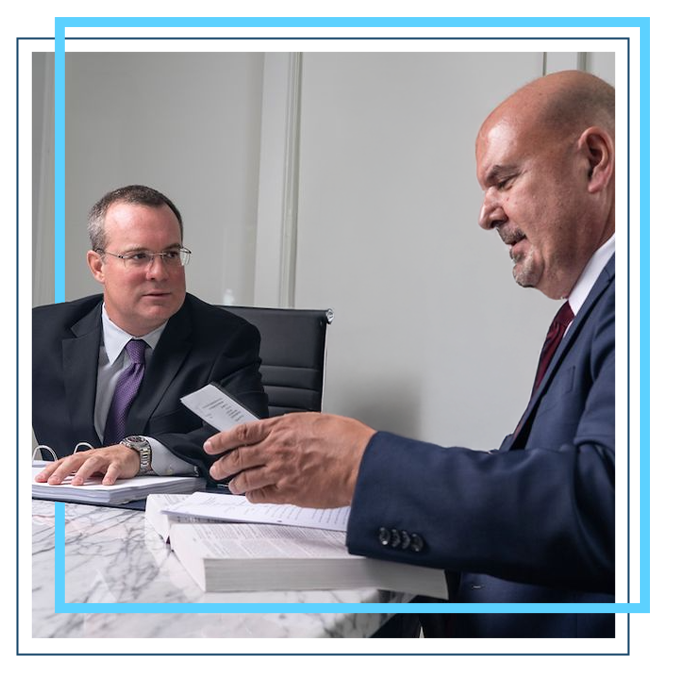
Miami Tax Evasion Attorney
Protecting Your Future: The Defense Strategy of a Top Miami Tax Evasion Lawyer
Have you been accused of tax evasion? If you’re under investigation by the IRS or have been accused of any type of tax violation, our dedicated team at Beckham Law Firm may be able to help. We represent clients who are facing this serious federal charge and other white-collar criminal offenses.
With our extensive experience handling IRS violations and our understanding of viable defenses to tax-related crimes, we are confident in our ability to protect your interests. Our Miami tax evasion lawyers can answer your questions and offer knowledgeable insight related to your case during a complimentary consultation.
For seasoned guidance built on over 35 years of combined legal experience, call (786) 244-8010 or contact our Miami tax evasion lawyer online!


-
Domestic Violence Case Dismissed
Domestic Violence Strangulation - At 4:38 PM law enforcement began to investigate, both the Defendant and Victim 1. The Defendant was taken into custody and taken into interview room for further questioning. The Defendant admitted that he and victim 1 were involved in a verbal dispute but denied that the incident ever became physical. The Defendant and the victims were inside the Defendants vehicle when the argument occurred.
-
Felony Case Dismissed
Felony Attempted Burglary - At 10:50 PM, law enforcement was dispatched in emergency mode to respond to a burglary in progress. The officer made contact with victim and he stated that he observed through the peep hole a male with a black shirt wearing a mask and hitting his apartment door with a hammer. The Defendant was attempting to gain force entrance.
-
2nd Degree Murder – Case Dismissed
At 7:43 PM, the Defendant who was a Miami-Dade Public Transit employee surrendered at the Miami-Dade Police Department. The Defendant and the victim engaged in a heated verbal dispute over which exit door the victim was supposed to utilize. The victim was belligerent and yelled obscene remarks to the Defendant who remained on the driver’s seat.
-
Aggravated Battery Charges Dismissed
Aggravated Battery on an Elderly Person - At 4:53 pm officers responded to a disturbance and upon arrival met with the elderly victim who stated that the Defendant and her had gotten into a verbal disagreement which then escalated into a physical altercation. The Defendant had struck the victim with a broom stick, a piece of a door frame and slapped her several times in the face with an open palm.
-
Multiple Charges Case Dismissed
Grand Theft, Domestic Violence, and Aggravated Battery - At 11:30 AM, law enforcement was dispatched in emergency mode in reference to a domestic battery. The officer made contact with the Defendant who stated that he and the victim got into a verbal argument. The victim decided to leave with the child. The victim stated that the Defendant began to argue with her reference to her being pregnant.
-
Felony Case Dismissed
Felony Drug Possession - At 3:47 AM, law enforcement officer observed the Defendant sitting on the bus stop past curfew. The officer conducted a subject check to find the reasons the Defendant was stationary at the location. The Defendant stated that he was playing a game that required him to be seated. The officer then conducted a pat down and a sharp pointy object was discovered in the Defendant’s left pocket.

Understanding Tax Evasion in Miami
The U.S. tax code is complex and can be difficult for any taxpayer to fully understand. It should come as no surprise that mistakes are often made on tax returns, but when does this become a crime? An innocent mistake may be remedied, but intentional attempts or acts of underreporting income or claiming fraudulent deductions may be considered tax evasion.
Tax evasion is a violation of Internal Revenue Code (IRC) § 7201. Willfully attempting to evade or defeat tax is a felony offense that is investigated by the Internal Revenue Service (IRS), prosecuted by the U.S. Attorney’s Office, and punishable by up to 5 years in prison and fines of up to $500,000. There are two primary types of tax evasion.
Accused of tax fraud? Call our Miami tax evasion attorneys at Beckham Law Firm to find out what our team can do to protect your interests. Call (786) 244-8010 or fill out our online contact form.


-
“I want to thank Beckham and Solis for guiding through this difficult process. Their level of expertise and understanding of different situations is paramount. I highly recommend hiring this firm as a representative for any case.”- Joel I.
-
“I'm so happy I found these lawyers on the Internet. I was very nervous and scared when I walked into the office, thinking a bad outcome could change my life drastically. They were able to get my case dismissed! I highly recommend Beckham Law Firm to my family and friends. Thanks for everything!”- Leonel D.
-
“Mr. Beckham is real, trustworthy, and more importantly knowledgeable. This was my first experience dealing with an attorney and I’m truly thankful I chose him and for all the help him and his associates provided me with.”- Ethan M.
-
“Mr. Beckham and his team were EXCELLENT! They were professional and informative. They walked me through the process and answered all my questions and concerns! And they advised me well! I Highly recommend them!”- Nelson F.
-
“I highly recommended Beckham Law Firm, for a top notch professional & straight forward criminal defense representation. They are fast, on point & available at anytime. Thanks to their experience and hands on attitude my case was dismissed. It is a total life changer. Thanks so much to the whole team you are the best!”- Luis C.
-
“I worked with Beckham Law Firm for two years. Their experience, expertise, and support helped me make the best decision to save my life. I was facing serious time, but it was all adjudicated. They got me out of the worst time of my life. Thanks!”- J.D.
-
“The Beckham Law Firm has been a tremendous help with my case. I cannot thank their team enough for the time, attention, and understanding with my case. Forever grateful for their help with case. Truly a phenomenal team!”- Shannon F.
-
“Few years back I ran into some legal trouble and was recommended to Beckham Law by a friend. I had never had to deal with any of this so, it was quite terrifying, to be honest. I walked into his office a nervous wreck, walked out confident and taken care of. Great service. Answers all calls whenever you need help and advice; they made a difficult situation better. I greatly recommend this firm!”- Carlens E.
-
“The staff at Beckham Law did an amazing job handling my case. They went above and beyond with closing everything in a timely manner. They were very reasonable with pricing and very flexible with payment. Barbara was very helpful answering any questions or concerns that I had. I highly recommend these law professionals to handle any legal matters you may need resolved.”- Joel D.


FAQs About Tax Evasion in Miami
-
A tax evasion audit may occur when the IRS detects unusual financial patterns, such as income not matching reported earnings or deductions outside the normal range. Offshore accounts, inconsistent filings, and whistleblower reports can also raise suspicion. In Miami, complex real estate, international transactions, and cross-border business activity increase scrutiny, making proactive legal and financial oversight essential to avoid unwanted IRS attention.
-
A Miami tax evasion lawyer helps you navigate IRS investigations, especially when financial activity involves international assets or complex business dealings. Local attorneys understand regional enforcement trends and can evaluate tax records, correct reporting issues, and communicate with federal authorities. Their guidance can reduce exposure, clarify obligations, and protect your rights, offering strategic defense before, during, or after an audit or criminal investigation.
-
Defenses to tax evasion charges often focus on proving lack of criminal intent, showing that errors resulted from misunderstanding or clerical mistakes rather than fraud. Lawyers may present accountant guidance, corrected filings, or legitimate documentation supporting transactions. In Miami, forensic analysis of international or investment activity may rebut IRS assumptions. Full transparency, early legal intervention, and credible evidence often strengthen defense outcomes.
-
Miami’s economy—shaped by foreign investment, luxury real estate, tourism, and international trade—creates extensive financial reporting obligations that draw IRS attention. Transactions involving offshore funds, cryptocurrency, and high-value assets may trigger audits or investigations. Because these activities require precise documentation, even innocent mistakes can appear suspicious. Understanding Miami’s economic landscape helps individuals and businesses prepare accurate filings and respond effectively to federal inquiries.
-
Stay calm, avoid making statements, and do not provide documents until speaking with an attorney. IRS investigators are trained to gather potentially incriminating information, so legal representation helps protect your rights. A Miami tax evasion lawyer can request records, communicate with federal agents, and determine whether the inquiry is civil, criminal, or preliminary, guiding you through the safest next steps.
-
Tax avoidance uses legal strategies—such as deductions, credits, and investment planning—to reduce tax liability. Tax evasion involves intentionally concealing income, inflating expenses, or misrepresenting financial information to avoid paying taxes. In Miami, where international holdings and investment portfolios are common, misunderstanding the difference may lead to investigations. Consulting a tax professional ensures compliance while minimizing unnecessary legal risk.
-
The IRS generally has six years to pursue criminal tax evasion charges, beginning from the date the return was filed. However, additional time may apply if fraud continues over multiple tax years. Because records and transactions in Miami often involve multiple jurisdictions, delays may complicate investigations. Preserving financial documentation and seeking legal guidance early help protect your interests if the IRS initiates action.


Why partner with Beckham Law Firm?
-
Strong Community
RootsOur strong relationships with local judges, attorneys, and law enforcement empower us to facilitate favorable resolutions for clients in even the most complex criminal cases. -
Comprehensive
KnowledgeWe know Criminal Law. With years of former prosecution experience and a longstanding reputation for achieving favorable outcomes for our clients, you can trust us to employ a strategic defense strategy for your unique case. -
Time-Tested Trial ExperienceOur attorneys are highly skilled litigators, empowering us to represent your best interests at every stage of the criminal process. From initial arraignment hearings to pre-trial motions to criminal litigation, we can provide a formidable defense in and out of the courtroom.
-
Proven Track Record of ResultsWith over 10,000 cases handled and over a 90% success rate, put decades of experience in your corner with Beckham Law Firm. We can diligently protect your rights from start to finish.










